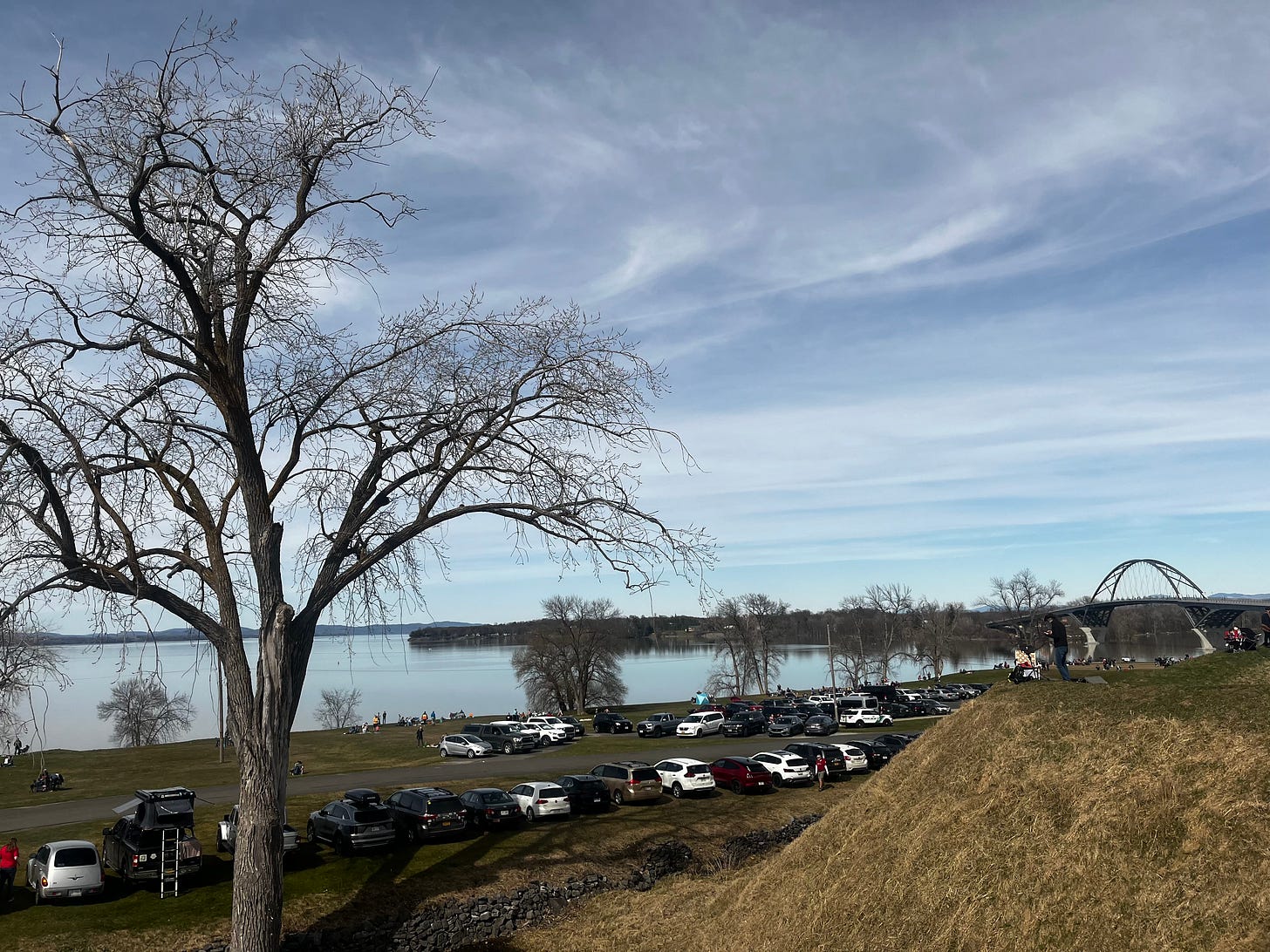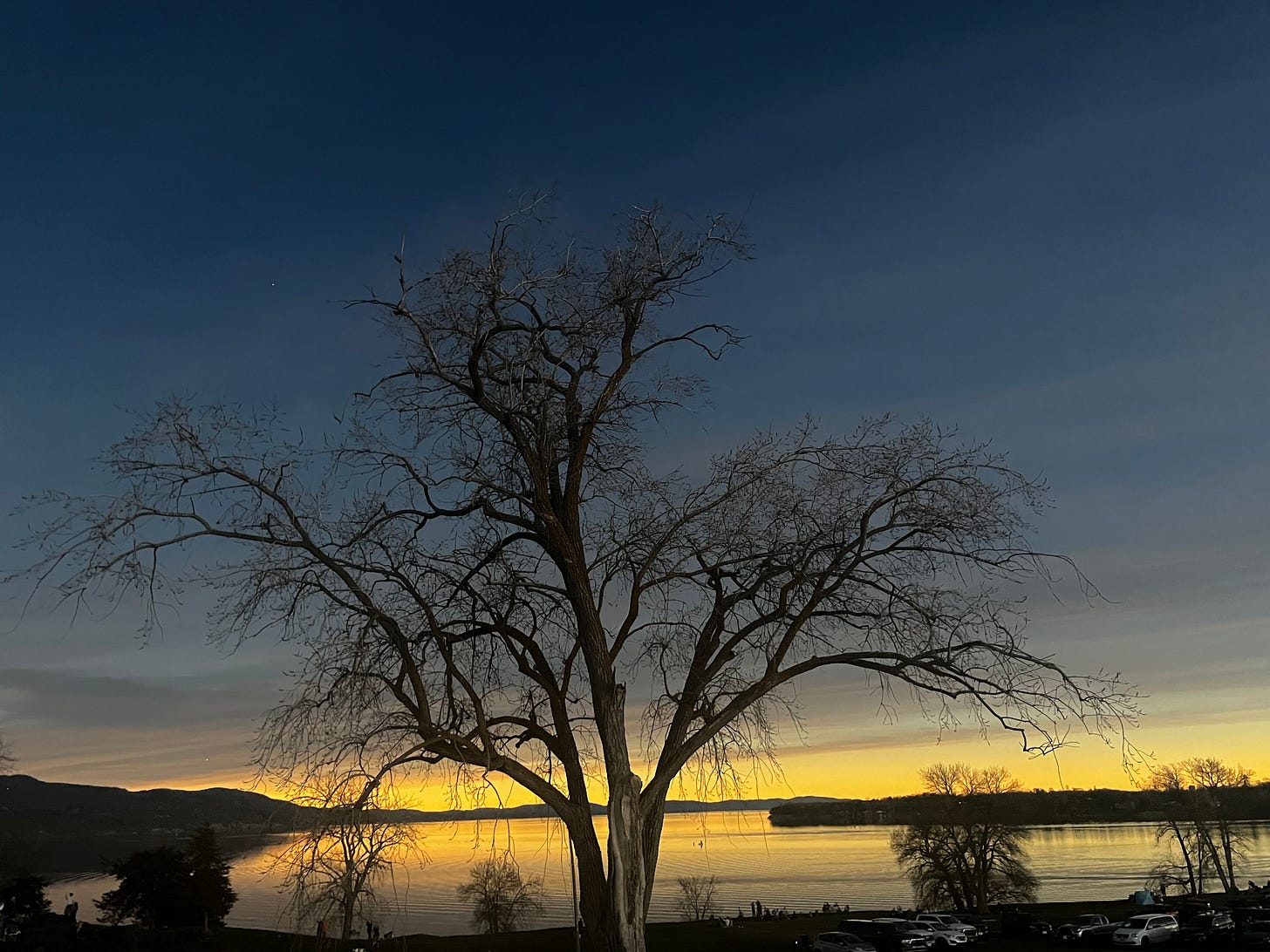On Totality, Criticism, and Act II
At noon on the day of the eclipse, my friend, husband, and I set up chairs atop a thin ridge on a hill in the Crown Point State Historic Site, Lake Champlain to one side and 18th century ruins to the other. Someone warned us to watch out for ticks the moment we arrived, and I slathered my ankles in DEET. Clouds of small flies plagued us throughout the day, coming and going in waves. Unsupervised children plagued us throughout the day, coming and going in waves. I expected that we’d be left alone so far up, but groups of people trod the narrow path every few minutes. I feared that one of us would fall off the steeper side and break our neck.
Though I had eclipse glasses, I’d left my sunglasses at home. The sun beat down on us, warmer than I’d felt it in months save for an anomaly of a day the month before.
I felt uneasy and wondered what was to blame: the precarity of the height, the crowd, or the impending eclipse itself. I asked my friend and husband if they felt weird but couldn’t really describe what I meant. It had been a strange week. I’d just gotten over the flu, my vocal chords still raw from coughing fits. We’d experienced an earthquake that I spent seconds convinced was a fever dream. After a week of total isolation, here I was among the public.
I hadn’t read Annie Dillard’s “Total Eclipse” since my first year of college, but hazy lines from the essay slid to the front of my mind the more unnerved I felt.
That morning, we’d stopped in a small town outside of Albany for scones and coffee and as we ate, I heard the barista and regulars chatting about the eclipse and those determined to view it. I’ve seen so many randos in here today who I guess took work off to stare at the sun. The sun—big whoop. It’ll probably be too cloudy for anyone to even see anything, anyway.
***
A critic who regularly writes takedown pieces—someone who’s trashed a few books and essays that I love—wrote a book and received the mother of all takedowns: a hit piece so biting that it went viral.
When I first read the review and all of the comments agreeing with it, I felt a little vindicated and immediately wondered why, once again, I was taking someone else’s bad review personally.
***
When I’d heard the baristas and patrons dismiss the eclipse and those who cared about it, I’d taken it personally. But maybe it’s comforting to call something garbage when you know you’ll never be able to access it.
***
Back in December, a critic slammed Renaissance: a Film by Beyoncé by accusing the artist of only being dedicated to the project of her own greatness. That phrase—only dedicated to the project of her own greatness—has been rattling around in my head since I read it. It brings to mind the people obsessed with their own greatness who aren’t Beyoncé: men partial to pissing on golden toilet seats, living men with their names etched into buildings, dead men with their likeness preserved in stone.
The review reminded of my teenaged self—dismissing anything too popular as drivel as a shortcut for having actual taste.
There’s a difference, I think, between something not being good and someone not relating to or understanding it. I abandoned my dream of being a Real Book Reviewer after disliking a galley that was more metaphysical than I had patience for. I realized that I didn’t want to spend time writing about something that I didn’t like or understand. Plus, knowing what it takes to create any work, much less get it published, makes it impossible for me to publicly bash something unless it’s actively hateful or willfully dishonest.
I don’t believe that all negative criticism is bad, but I do think the place where it comes from matters. To me, good critics are not only in tune with the medium they’re exploring but with themselves. Not only can they distinguish a poorly executed project from a project that merely isn’t their taste, but they recognize why a work activates their disinterest or disgust. They can differentiate between confusion caused by the failures of the artist and confusion caused by their own failures as a consumer—insufficient knowledge, familiarity, or empathy. They recognize their own envy or bitterness or projection and refuse to let it get in the way of the work. They can pinpoint why an artist evokes a reaction in them that is that is strong enough to write about.
***
I’d seen the partial eclipse back in 2017, and Dillard was absolutely correct: “Seeing a partial eclipse bears the same relation to seeing a total eclipse as kissing a man does to marrying him, or as flying in an airplane does to falling out of an airplane. Although one experience precedes the other, it in no way prepares you for it.”
Most of the day at Crown Point was spent waiting. We had about three hours of nothing, then the slightest fingernail of the sun went away, then gradually more of it was gone until people began exclaiming about the temperature drop and the shadow rolling our way from the mountains.
My general sense of foreboding dissipated during those few minutes just before and during totality, washed away completely as I focused on the weirdness of what was. I was so thrown off by the filter of everything, the bigness of being inside a once in-a-lifetime moment. I felt swollen with gratitude, gobsmacked by the sky.
When I first read “Total Eclipse,” I could not imagine what was actually being described, no matter how perfectly Dillard described it. One of the small beauties of getting older has been understanding things that I didn’t even realize I’d been ignorant of. As a young person, I’d read about an experience I’d never had and now, I was inside of it.
Reading it before was all abstract. I thought it was exaggerated, maybe even overwritten. But now? Her still trying to capture what she saw years later makes absolute sense. It’s impossible not to babble and build metaphor on top of simile on top of analogy to convey the eclipse’s terrific magnitude. Seeing it brought on a hunger to feel something that can render me incapable of analysis or any emotion beyond pure awe.
The moon shifted again and I wanted it to go back. It felt like a loss. In its place was rushing and packing and traffic.
***
I connected to Cowboy Carter on several levels but especially as a Black woman from the south who still holds a complicated relationship to the places where I grew up. For things to stay the same, they have to change again. Whole lotta red in that white and blue. This house was built with blood and bone.
Beyond this, it’s an album I get lost in. Yes, it’s smart, but it’s so much more than that.
There’s vulnerability, softness, sweetness. It’s explosive, fun, playful, fearless. It’s a textured tapestry of sound—I hear The Beatles, Dolly Parton, Fleetwood Mac, The Beach Boys. I’m grateful to be on whatever wavelength makes its power obvious to me.
I imagine Beyoncé recreating her 2016 CMA performance, belting out “Daddy Lessons” for a sea of performatively blank faces. I see a close up of her eyes registering the crowd’s hostility and pointed disinterest, then the briefest display of panic appearing before being supplanted by a knowing gaze encompassing unadulterated confidence. She stops singing, the music fades, and she belts out the opening lyrics of “American Requiem” a capella before the band kicks in full swing. It's a lot of talkin' goin' on while I sing my song.
When I learned that Beyoncé was largely inspired to create Cowboy Carter after an icy reception at the CMAs, I thought about Kendrick Lamar repurposing the disparaging remarks that conservative pundits made about his previous album on Damn. Neither star created their album to win over their critics, but their compulsion to process their emotions through music led to art being made that brought joy and inspiration to millions.
***
Driving slowly while looking for parking that night late after seeing the eclipse, my stomach suddenly dropped and a sweet smell filled the air. I looked at my husband and he looked at me. My airbag had deployed—I didn’t see it happen—only the aftermath of a deflated shell and settling white dust. A Tesla sat about 50 feet in front of us with its flashers on. Like us, that car hit a pothole deep enough to trigger the airbag. The Tesla was undrivable; the axel snapped. My husband called the insurance company and made an appointment to take the car into a shop the next day. We walked home shaken and surprised, but physically unmarred.
***
Anything you find beautiful or brilliant has been deemed less-than by someone else: the absence of poetry or rigor in the words, the sky not dark enough, the shift of heavenly bodies frivolous. There’s always something to be criticized. It’s taken a month to get this essay out because a more recent me kept finding fault with what past me had written before—no doubt will a more future me find fault with what this is now.
Worrying about it is as useful as fearing death.
The bad thing is undoubtedly going to happen, and though to be human is to let inevitable terror creep toward the heart, along the way is look at that horse, look at that horse, look at that horse and fire dancing in the sky and understanding an essay a decade after reading it and frivolity and camaraderie and—thank you thank you thank you—another fraction of a trip around the sun.
—
My poem “Everything is Everything” was published in the Spring 2024 issue of Pleiades, and you can order it here.







